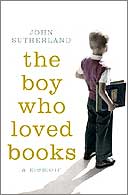
The Boy Who Loved Books: A Memoir
by John Sutherland
272pp, John Murray, £16.99
"It is long ere we discover how rich we are. Our history, we are sure, is quite tame: we have nothing to write, nothing to infer. But our wiser years still run back to the despised recollections of childhood, and always we are fishing up some wonderful article out of that pond; until, by and by, we begin to suspect that the biography of the one foolish person we know is, in reality, nothing less than the miniature paraphrase of the hundred volumes of the Universal History." Thus Ralph Waldo Emerson, in Intellect. And hence John Sutherland, emeritus professor at University College London, and The Boy Who Loved Books
Sutherland was born in 1938 and has a spent a lifetime writing about Them, the great authors: Thackeray, Dickens, Walter Scott, Thomas Hardy and, as the author of The Longman Companion to Victorian Fiction (1988), pretty much all the others too. He is a thoroughly brisk, likeable, no-nonsense sort of critic, more interested in sketching in contexts and explaining careers than in the niceties and delicacies of language. "'A literary sociologist', I liked to think of myself over the following decades," he admits. "It helped mask the fact that I wasn't much of a critic."
He's being modest, of course: he is rather a lot of a critic. As well as his academic work he writes columns for newspapers and magazines, and the series of books - Is Heathcliff a Murderer? (1996), Can Jane Eyre Be Happy? (1997), and Who Betrays Elizabeth Bennet? (1999) - in which he hunts out and explains inconsistencies in classic novels, may be the closest thing there's ever been to bestselling literary criticism. Critically, one might say, he has left no stone unturned, or literary pot unpissed in. (In Who Betrays Elizabeth Bennet? one of the questions he addresses is: why are there no public conveniences in Casterbridge? Answer: because in Dorset in the late 1840s there were no public conveniences.)
Now, nearing 70, Sutherland the critic turns unto himself, from Them to I, and from interpretation to self-interpretation: George Steiner has of course been there before, in Errata; and Terry Eagleton, in The Gatekeeper; the incomparable Lorna Sage; Charles Lamb; the list goes on. One's only real complaint about Sutherland's memoir is about its title, which is rather misleading: Sutherland writes hardly at all about books, and whenever he does he leaves the reader yearning for him to return to what he writes about best, which is people and places and stuff. This is not a book about the growth of a mind; it is, properly, a book about the growth of a boy, at a particular time, and in a particular way: from grammar school through national service, to university, into alcoholism and finally, thank goodness, serenity and success.
Sutherland came from a lower-middle-class family: his father, Jack, was admitted to Edinburgh University, but never took up his studies and instead joined the Metropolitan Police. Jack rowed, swam, golfed, boxed against Max Baer, the great Jewish heavyweight champion, and died in 1942, on a training mission with the RAF in South Africa. Sutherland was four at the time. "Having a lifelong relationship with a dead father, not to be too Hamlet-like about it, is tricky."
In fact, Sutherland's relationship with his father seems straightforward compared with his relationship with his mother, the delightfully and despicably irresponsible Maud, who renamed herself Liz and who had a way with "nail varnish, lipstick, blond hair [ ...] cigarettes and Ronson lighters". After the death of her husband, Liz abandoned the young Sutherland with relatives and went to Argentina to be with her lover. On her return after the war, she found an unlikely job as a welfare officer on a council estate, later became a JP, would occasionally feed her son scrambled egg sandwiches, but seems to have spent most of her time cultivating a relationship with a car salesman whom Sutherland deigns to refer to only as the "rich bastard".
He remarks of his mother that she was "never deeply involved in lives other than her own". It's a trait he's inherited, and a gift, perhaps, in a writer; it certainly allows him to be unsentimental - one might even say unsparing - in his assessment of others. His grandparents, for example, he describes as "withered time-servers, relics of themselves", which does rather seem short shrift. But then he's angry with them, and with all his family, and their pathetic little lives. He complains continually about Essex, and the accent, "the ugliest" of all, and his family's attempts to have their voices purged of the "horrible Essex whine".
There is a touch of the Essex whine left in him - can one imagine a good critic without it? - but Sutherland saves himself in a conclusion that involves a long and literal counting of blessings. "I was the first member of my family to attend a university - not because I was cleverer, more diligent, or more virtuous. I merely coincided with a historical opportunity." Thus, escaping solipsism, he becomes us all; the Universal History. Emerson would have approved.
· Ian Sansom's Mr Dixon Disappears is published by Harper Perennial

